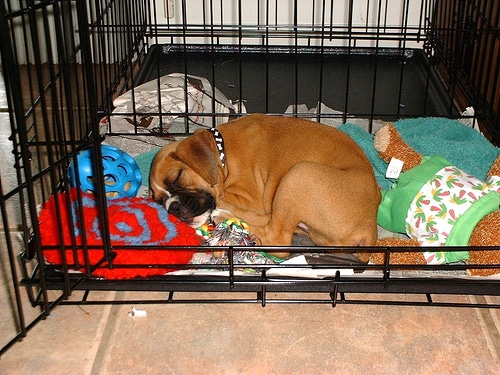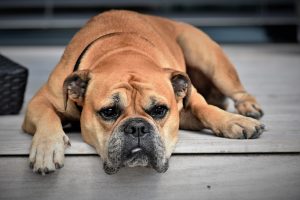One tiny flaw of advanced modern medicine is that we depend on it too much and too quickly. Dogs LOVE to sleep, which makes the situation alarming when they don’t.
Dogs are creatures of habit, and there’s always a good reason (or an underlying problem) if and when they break their habit.
If your dog has stopped sleeping at night, you should identify and resolve the problem before resorting to any sleeping pill or over-the-counter drugs.
So, how do you calm a restless dog at night without external drugs?
Sleep Aids to Help Your Dog Sleep at Night
You can try employing some of these sleep aids if your dog used to sleep like a log at night but suddenly stopped.
1. Comfortable bed
Can you sleep in an uncomfortable bed? We shouldn’t expect our doggos to bear unnecessary discomfort, either.
If you require a good and cheap bed under £100, there’s nothing better than PetFusion’s Original Dog Bed – you can buy it here.
2. Calm environment
We all know that dogs need a peaceful environment to sleep in, but setting up a calming environment might just be the stimuli your dog needs. Put calming music and scents near your doggo’s bed to help them relax. Make sure their living area is clean, dry and warm.
Buy Calming Songs for Dogs on Amazon
3. Calming Medicine
If your dog’s insomnia is caused by anxiety or stress, then some medicine using natural ingredients may help.
Don’t confuse calming medicine with sleeping pills. They are the non-drowsy kind that just helps your dog relax.
If your dog is not allergic to hemp oil, you can use that as well. But don’t use it without consulting a doctor.
Buy Billion Pets – Hemp Oil for Dogs on Amazon
4. Good nutrition
Poor nutrition can lead to many problems for a dog, including sleeping problems. Ensure you feed your dog quality wet and dry food full of vitamins, minerals and fibrous goodness.
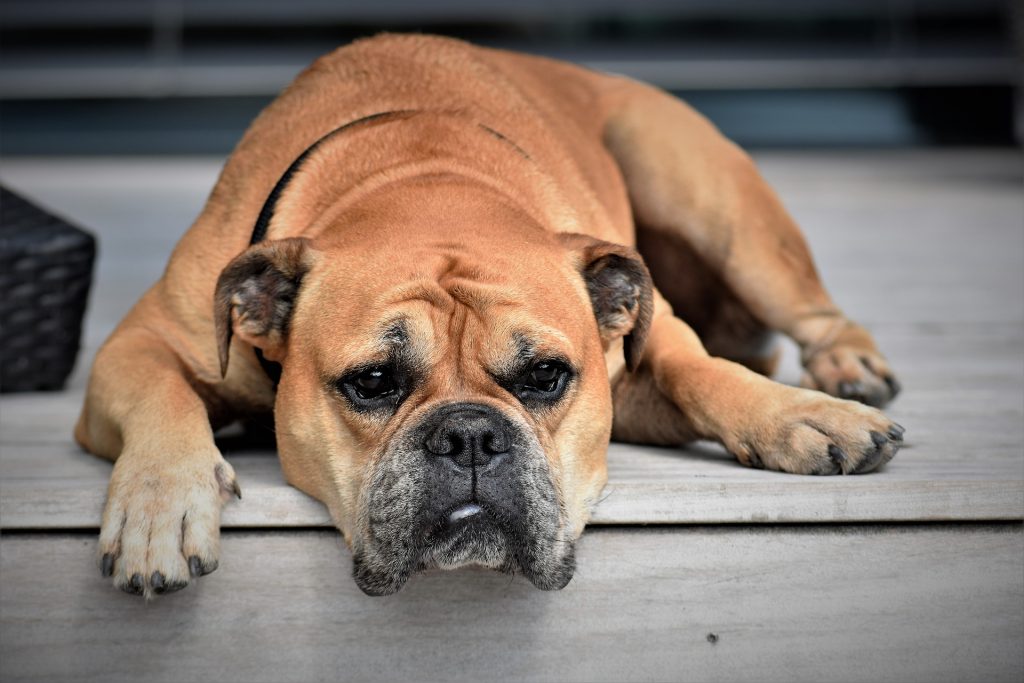
5. Exercise
If your doggo has pent-up energy, you’ll find them pacing and running around the house instead of sleeping at nighttime.
Dogs sleep a lot when they’re tired, so take them on walks and let them play regularly. You can hire a dog walker / pet sitter to tire your doggo out when you’re not free. Letting your dog exhaust their energy will ensure a good night’s sleep for both of you.
If nothing works, the problem might be more serious than we originally thought. Still, don’t jump to any conclusions – try to identify the problem before resorting to sleeping medication.
Dog Insomnia: What to do when your dog isn’t sleeping at night?
According to WebMD, insomnia is a sleeping disorder that prevents you from falling or staying asleep. There are two types: acute (short-term) and chronic (long-term); dogs suffer from the former more often.
The thing about insomnia is that it’s not a disease (or a problem). It’s a byproduct (or symptom) of another big issue.
1. Anxiety & Depression Due to Loneliness
Newly housebroken dogs suffer sleeplessness because they’re scared and anxious in the new environment. You should help them make a seamless transition into their new home.
Severe anxiety and depression can cause insomnia in susceptible breeds like pugs. Additionally, your puppy might feel lonely if you’re always away and there’s no one else in the house to interact with.
Dogs are social animals like us and need companions to live a healthy life. If your dog is showing symptoms of depression, be there for them and seek help from a medical professional.
Sleep Aid:
You should allow your dog to sleep near you (on the bed or in their crate) and let them roam around the house during the day. Getting locked up inside a crate is the leading cause of anxiety among canines. Play with them whenever you can; it’s fun for both parties.
3. Sleep Apnea & Other Disorders
Sleep Apnea is often associated with snoring and other symptoms caused by underlying breathing problems. It’s not uncommon in dogs but not entirely impossible either.
That said, some dog breeds are more inclined to suffer from breathing problems, preventing them from catching the Z’s at night. Stuffy-faced breeds like pugs and bulldogs often suffer from sleep apnea.
Aid for Sleep Apnea: You should consult your veterinarian if your dog is suspected of suffering from sleep apnea. Once diagnosed, you can choose from the many solutions, such as dog beds with elevated sides for the appropriate head position.
Despite your best efforts, consult a vet if you cannot diagnose the cause of your doggo not sleeping at night. Your dog might suffer from an uncommon problem such as Narcolepsy or restless leg syndrome.
Narcolepsy causes your body to be extremely tired but never relaxed, which can severely affect sleep cycles and cause anxiety among dogs. Don’t forget that dogs need their REM sleep just as much as humans, maybe more, given how active they are.
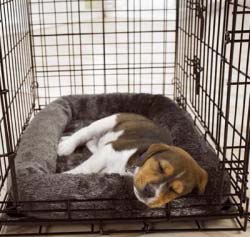
4. Internal Pain
It’s more common in hyperactive and senior dogs. Prolonged joint and muscle pain can affect health, daily activity and ultimately, sleep schedule. Arthritis, pain in the neck disc, and pain in anal glands are also common among dogs.
Internal pain is hard to diagnose unless you notice your dog’s movements. Check for less than usual physical activity or limping while walking/running. Seek medical attention immediately if you suspect an internal injury or pain.
Read More: How often should you get a new dog bed? How to make the transition?
5. Digestive / Bladder Issues
Your dog might be unable to sleep at night if they want to pee or poo. A well-planned bathroom schedule is ideal in such situations.
They could also be in pain due to indigestion or other digestive issues. Look for signs of discomfort and investigate their poo for some clues indicating digestive problems.
6. Courtesy of Medication & Unnecessary Distractions
Nighttime sleeplessness can also be a side effect of one of the prescriptions your dog is on. Get their medicines checked by a vet to be sure.
Most of these medicines will make your doggo a light sleeper which becomes an issue if there are unnecessary distractions around. Look for weird smells and sounds around your dog’s bed.
It’s generally a good idea not to put your dog’s bed near a window or door because of traffic and other noise.
Speaking of nighttime distractions, ensure your dog’s bed doesn’t have critters or bugs.
Are sleeping pills safe for dogs?
Sleeping pills are generally too strong and unsafe for dogs unless prescribed by a certified veterinarian. If your dog can’t sleep due to anxiety, you should try over-the-counter calming medicines, melatonin supplements and pheromone collars instead of sleeping pills.
1. Is melatonin safe for dogs? How much can you administer?
Melatonin is a hormone produced by our brains. Its production signals our brain that it’s bedtime. In dogs, this hormone has a sedative effect that signals them to calm down, relax, or even sleep. It’s perfectly safe for dogs as prescribed by a certified vet.
The recommended melatonin dosage is 0.1mg per kg (dog weight) as a calming remedy for anxiety disorders and 3 to 6mgs per kg (dog weight) as a sleeping medicine for sleep disorders. So, the maximum dosage of melatonin you can administer to 10-20kg is 30 to 120mg per day.
2. Is valium safe for dogs?
Valium, also known as Diazepam or benzodiazepine (a common sleeping pill), is a human and canine sedative and muscle relaxant. It’s not safe for dogs. It’s not even very good with humans, for that matter, but that’s a discussion for another day.
If your dog is anxious and needs to relax, there are much better alternatives, as discussed in this article.
3. Can you give Z-drugs to your dog?
Z-drugs for dogs are like benzodiazepine (valium) for humans. It’s used to help treat severe insomnia.
Z-drugs are not safe for dogs and must not be given until a certified veterinarian has advised you to do so. They are too strong, and giving such risky drugs to your doggo without medical supervision would be very irresponsible.
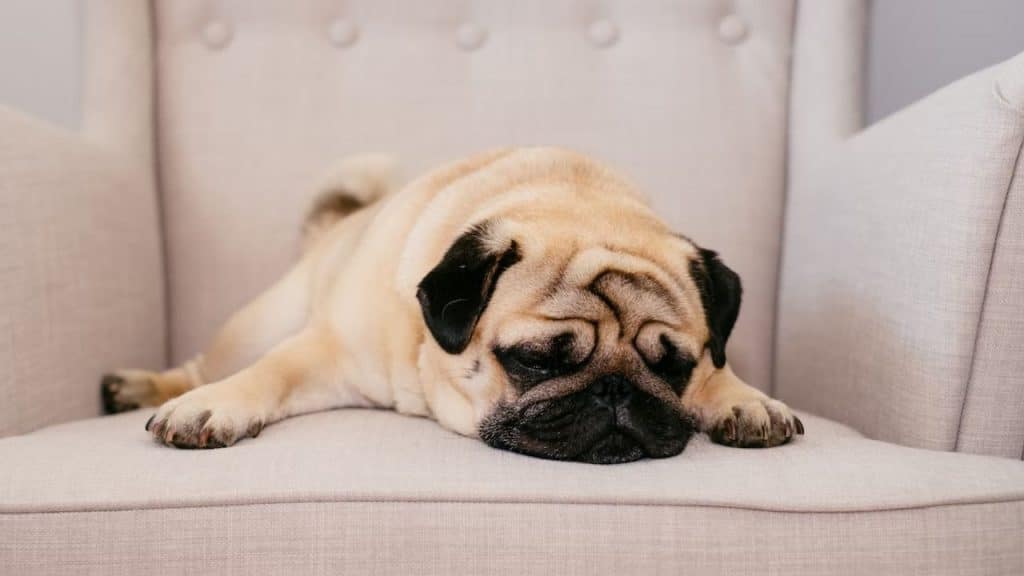
4. Can I give my dog Benadryl to sleep at night?
Benadryl isn’t ideal for dogs, even though it’s administered to some dogs for cases of anxiety and panic. The medicine isn’t for dogs but for humans, so it can have adverse side effects with various breeds if you’re not careful.
Additionally, Benadryl is an extreme alternative to a problem with easier and safer solutions. There are other safer (and calming) OTC drugs you can give to your dog. You should only give your dog Benadryl if its veterinarian recommends it.
Read More: How to help your dog cry less in its crate?
Dog Sleep Aids for Travel
Travelling with a dog is a surprisingly easy chore with most breeds. If your dog is comfortable with you and doesn’t have excessive anxiety, you don’t need any external help during travel.
But let’s say your dog is anxious. Before asking your vet for medication, you should first try devices such as a ThunderShirt (for swaddling) or a calming pheromone collar.
You’ll have to resort to calming medication or sedation if nothing else works.
Buy ThunderShirt Dog’s Anxiety Coat on Amazon
Pro Tip: Give your dog the prescribed medication at home as a “dry run” to check for side effects and their physical reaction to the medicine. Trust me. You don’t want surprises in an outdoor environment with a canine.
